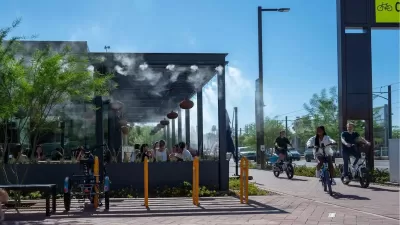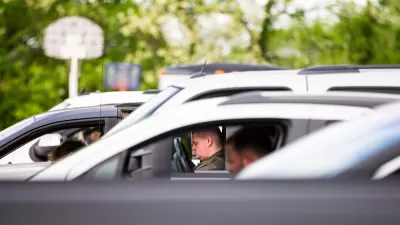Despite initial skepticism about its true potential for sustainable urbanism, the built-from-scratch “car-free neighborhood” is widely popular with its residents.

Culdesac Tempe, which billed itself as the nation’s first ground-up car-free neighborhood, seems to be a success for its residents, writes Ben Ikenson in Dwell.
With the first phase finished last year, the high-profile development continues to unfold on a 17-acre site along a light rail line in an established neighborhood about 15 miles east of downtown Phoenix. The $200 million project now includes 288 apartment units with about 300 tenants, reeling residents in with appeals of a healthier, more eco-friendly lifestyle, built-in community with ample amenities, and accessible transit to Tempe and the greater metro area.
According to Ikenson, the neighborhood received criticism for being relatively isolated and, according to Strong Towns, not “the incremental urbanism and thickening our cities need.” (Later, Strong Towns revised its opinion, noting “We all have a hand in building strong towns, and it can take many different forms. We’re here to celebrate every effort.”)
Residents seem satisfied with the neighborhood’s walkability, amenities, and transit access. The community offers free e-bikes and transit passes — and residents actually use them. Residents also say rents are reasonable, with studios starting at $1,300 per month in a region where median rent for a studio is $1,375.
Kevin DeGood, director of infrastructure policy at the Center for American Progress, acknowledged the community’s success, noting, “We need more housing and land use experimentation, not less. And bold experiments like Culdesac show there is real demand for alternatives.”
FULL STORY: America’s “First Car-Free Neighborhood” Is Going Pretty Good, Actually?

Maui's Vacation Rental Debate Turns Ugly
Verbal attacks, misinformation campaigns and fistfights plague a high-stakes debate to convert thousands of vacation rentals into long-term housing.

Planetizen Federal Action Tracker
A weekly monitor of how Trump’s orders and actions are impacting planners and planning in America.

In Urban Planning, AI Prompting Could be the New Design Thinking
Creativity has long been key to great urban design. What if we see AI as our new creative partner?

Milwaukee Launches Vision Zero Plan
Seven years after the city signed its Complete Streets Policy, the city is doubling down on its efforts to eliminate traffic deaths.

Portland Raises Parking Fees to Pay for Street Maintenance
The city is struggling to bridge a massive budget gap at the Bureau of Transportation, which largely depleted its reserves during the Civd-19 pandemic.

Spokane Mayor Introduces Housing Reforms Package
Mayor Lisa Brown’s proposals include deferring or waiving some development fees to encourage more affordable housing development.
Urban Design for Planners 1: Software Tools
This six-course series explores essential urban design concepts using open source software and equips planners with the tools they need to participate fully in the urban design process.
Planning for Universal Design
Learn the tools for implementing Universal Design in planning regulations.
Gallatin County Department of Planning & Community Development
Heyer Gruel & Associates PA
JM Goldson LLC
City of Camden Redevelopment Agency
City of Astoria
Transportation Research & Education Center (TREC) at Portland State University
Jefferson Parish Government
Camden Redevelopment Agency
City of Claremont





























